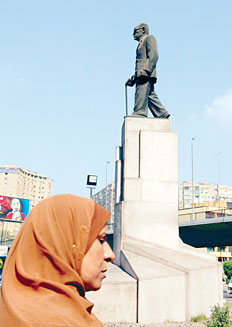|

Midaq Alley, 1966.
God’s World: An Anthology of Short Stories, 1973.
Mirrors: A Novel, 1977.
Miramar, 1978.
Children of Gebelawi, 1981.
The Thief and the Dogs, 1984.
Wedding Song, 1984.
Autumn Quail, 1985.
The Beginning and the End, 1985.
The Beggar, 1986.
Respected Sir, 1987.
The Search, 1987.
Fountain and Tomb, 1988.
The Day the Leader Was Killed: A Novel, 1989.
Palace Walk, 1989.
Palace of Desire, 1991.
The Time and the Place and Other Stories, 1991.
The Journey of Ibn Fattouma, 1992.
Sugar Street, 1992.
Adrift on the Nile, 1993.
The Harafish, 1994.
Arabian Nights and Days, 1995.
Akhenaten, Dweller in Truth, 2000.
The Cairo Trilogy [Palace Walk / Palace of Desire / Sugar Street], 2001.
Naguib Mahfouz at Sidi Gaber: Reflections of a Nobel Laureate, 1994–2001, from Conversations With Mohamed Salmawy, 2001. Khufu’s Wisdom, 2003.
Rhadopis of Nubia, 2003.
Thebes at War, 2003.
Voices from the Other World: Ancient Egyptian Tales, 2003.
The Dreams, 2004. |
 |
KHALED EL-FIQI/EPA/CORBIS
|
|





